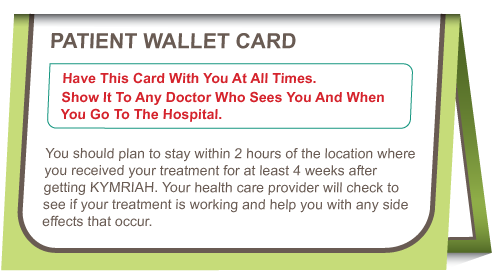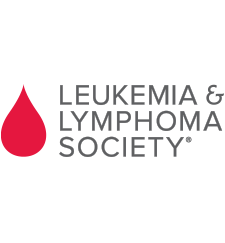Download helpful materials to support you throughout KYMRIAH therapy.
Understanding Side Effects
KYMRIAH
What side effects may I experience with KYMRIAH?
There are side effects you may experience with KYMRIAH® (tisagenlecleucel) therapy. Your treatment team knows what to expect and is prepared to help manage these side effects.
KYMRIAH may cause side effects that are severe or life-threatening. Call your health care provider or get emergency help right away if you get any of the following:
- Difficulty breathing
- Fever (100.4°F/38°C or higher)
- Chills/shaking chills
- Confusion
- Severe nausea, vomiting, diarrhea
- Severe muscle or joint pain
- Very low blood pressure
- Dizziness/lightheadedness
- Headache
Cytokine Release Syndrome
Cytokine release syndrome (CRS) is a common and expected side effect that happens when the immune system is highly activated, as with KYMRIAH therapy. It can range from mild symptoms like fever and muscle pains, to severe symptoms like low blood pressure and breathing trouble.
Your treatment team is prepared to manage CRS. Mild-to-moderate CRS may require hospitalization, antibiotics, and pain medications. Severe CRS may require medication, a stay in the intensive care unit (ICU), or breathing support.
Neurological Events
KYMRIAH may also have effects on the brain. You may feel very confused, unaware, or agitated. More severe symptoms might affect your speech or cause hallucinations or seizures. In most cases, symptoms occur within 8 weeks of receiving KYMRIAH and resolve within 3 weeks. They may go away on their own, but be sure to tell your doctor right away if you experience any neurological signs or symptoms.
Allergic Reactions
Serious allergic reactions, including anaphylaxis, which is a life-threatening allergic reaction, may occur after you receive KYMRIAH. Some signs and symptoms may include difficulty breathing, very low blood pressure, dizziness, swelling under skin, rash, nausea, and vomiting. You should seek emergency medical treatment right away if you have an allergic reaction.
Serious Infections
KYMRIAH can increase the risk of life-threatening infections that may lead to death. Tell your health care provider right away if you develop fever, chills, or any signs or symptoms of an infection.
Prolonged Low Blood Cell Counts (Cytopenia)
KYMRIAH may cause a condition called cytopenia. This is when you have low levels of one or more types of blood cells. Your treatment team will do blood tests to check all of your blood cell counts after treatment with KYMRIAH. Cytopenia that lasts a long time (is prolonged) may increase your risk of infection. Cytopenia will be monitored, and your treatment team is prepared to manage it. Tell your doctor right away if you get a fever, are feeling tired, or have bruising or bleeding.
Low Antibody Levels (Hypogammaglobulinemia)
Because KYMRIAH CAR-T cells are designed to detect and destroy your B cells, they will also attack the normal B cells in your body. B cells defend your body by producing antibodies. Antibodies bind to invaders so other immune cells can destroy them.
After KYMRIAH, you may have fewer normal B cells and, therefore, fewer antibodies. A low level of antibodies in your blood is a condition called hypogammaglobulinemia (HY-po-GAM-muh-GLOB-u-lin-EE-mee-uh). If untreated, a low antibody level may increase your risk for infections. Your treatment team can manage this with antibody replacement medications (for example, IVIG infusions). Tell your doctor right away if you develop signs or symptoms of an infection.
Effects on Ability to Drive and Use Machines
Do not drive, operate heavy machinery, or do other dangerous things for 8 weeks after you get KYMRIAH because the treatment can cause temporary memory and coordination problems, including sleepiness, confusion, weakness, dizziness, and seizures.
Common side effects
The most common side effects of KYMRIAH are:
- Difficulty breathing
- Fever (100.4°F/38°C or higher)
- Chills/shaking chills
- Confusion
- Severe nausea, vomiting, diarrhea
- Severe muscle or joint pain
- Very low blood pressure
- Dizziness/lightheadedness
- Headache
These are not all the possible side effects of KYMRIAH treatment. Talk to your treatment team about other possible side effects and medical advice about side effects. You are encouraged to report negative side effects of prescription drugs to the FDA. Visit www.fda.gov/medwatch, or call 1-800-FDA-1088.

After you get your new KYMRIAH CAR-T cells, you may feel bad in different ways, including feeling sick, tired, or very warm. Sometimes these feelings will go away on their own, but your doctor is here to help you if they don't.
What is the KYMRIAH REMS Program?
A risk evaluation and mitigation strategy (REMS) is a program to manage known or potential serious risks associated with a drug product and is required by the FDA to ensure that the benefits of the drug outweigh its risks. Because of the risk of CRS and neurological toxicities, the FDA has required a REMS for KYMRIAH. KYMRIAH is only available through select treatment centers participating in the KYMRIAH REMS Program.
The KYMRIAH REMS Program patient wallet card
As part of the KYMRIAH REMS Program, you will be given a wallet card either before or at the time of receiving a KYMRIAH infusion. Be sure to carry your completed wallet card with you at all times.

Visit www.KYMRIAH-REMS.com to learn more about the program or to download a replacement card if needed.



